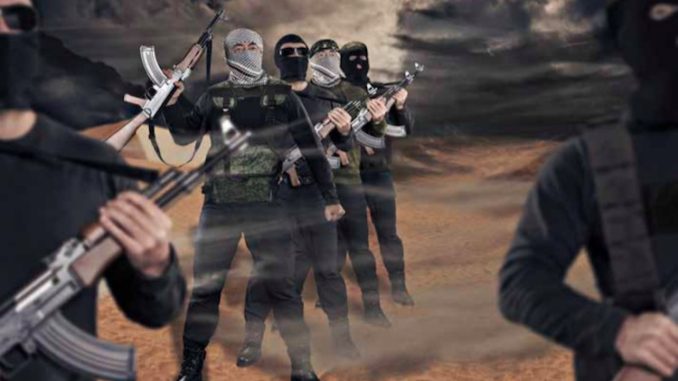
Dr John Battersby of Massey University’s Centre for Defence and Security Studies writes that terrorism is a tactic, it’s evolving, and it’s not going away, with new technologies such as unmanned vehicles and artificial intelligence likely to enable the delivery of terror by remote control.
Terrorism has a long pedigree, predating all the religions that have become associated with it in modern times. It has experienced iterations driven by ideologies entirely divorced from any religious belief, and it has been prompted by political, economic, ethnic and ecological concerns and occasionally – arguably – by neither of these.
The history of terrorism is multifaceted – it is not a purely religious phenomenon – and the future of terrorism will be no different.
The current period of Islamist inspired militancy may be a distinctly recognisable period in the history of terrorism, fuelled in the foreseeable future by the failure of state regimes in many cases across the Muslim world to act in the interests of their citizens. But already the term ‘Buddhist Extremism’ has emerged in the context of state repression of a Muslim minority population in Myanmar, indicating the possibility of a range of religious ideologies that could be bent to incite extremist violence.
Terrorism is a tactic, usually of the desperate, disenfranchised or entirely unpopular who perceive little other option than to resort to planned aggravated violence against ordinary people who pose no direct threat. It is a tactic that can be used by anyone.
It has been used by revolutionaries, nationalists, criminals and even pacifists. It has been used by governments against non-compliant populations, and has been used by democratically elected governments against other democratically elected governments to seek, preserve, advance and protect a ‘national interest’.
Terrorism in the future will remain a tactic in the tool box of those desperate to maintain a status quo, or desperate to change one where conventional options are seen as unavailable.
It has been tempting to accept the notion of new terrorism as a permanent phenomenon and that older style sectarian terrorist organisations are a thing of the past. Iraq’s Kurds have now voted on independence, a prospect no one else in the Middle East region welcomes. The Kurdish Peshmerga are a professional, battle hardened and determined group with foreign fighters among its ranks. The PKK is already regarded as a terrorist organisation and continues terrorist violence against Turkey.
Kurdistan may well be a renewed terrorist battlespace, and one which the West will not be able be to vilify so easily as religious fanaticism.
The Catalans also appear set to make their statement of independence by referendum, which is not being greeted enthusiastically by Spain. Spain’s history of political conflict and violence is lengthy and well known. If expectations expressed are squashed in Catalan, there are no shortage of historical precedents to follow.
New Zealand’s own region is not without nationalist murmurings, with referenda pending for Bougainville and New Caledonia – both territories which have histories of political violence in living memory.
If sectarian terrorist organisations re-emerge, they will do so in modern guise. The jihadists may have revised the terrorism playbook, but they do not own it. They have pioneered a new wave of volume-based aggravated violence, setting a bar of lethality against civilians that emerging terrorist organisations will feel compelled to meet to be taken seriously.
Even if Jihadism declines it has already refashioned the look of present and future terrorism.
“We will not negotiate with terrorists” so most governments say, but most governments will – and the future of terrorism will continue to include talks where tangible objectives exist, when both sides realise that winning by terrorism, or defeating it by military and enforcement action alone, are both equally bleak, dangerous and uncertain.
Enjoying this article? Consider a subscription to the print edition of Line of Defence.
Terrorist offences will continue to attract the harshest of penalties – but those convicted are likely to be released much earlier than the terms of their sentences because terrorism is about context; when the context in which terrorism occurs changes, the need to keep people imprisoned is perceived to be much less.
Israel has released hundreds of convicted terrorists from time to time as the political environment undulates. Large numbers of FARC prisoners have been released since 2015, and prosecutions against others dropped under the negotiated settlement in Colombia.
The current Islamist inspired militancy will last as long as prevailing local political and international conditions make it relevant. Its most dangerous aspect is its unpredictability – leaderless jihad prompts individual or small group actors to emerge in unexpected places, without the need for complex intelligence, weapons acquisition or planning networks.
It starkly exposes the vulnerability of free societies. But its ‘leaderless-ness’ is also its fundamental weakness – it has no direction, no tangible earthly goal, and a leaderless movement cannot go anywhere.
In 1986, a Police station in Melbourne was the target of a massive car bomb that exploded killing a police officer, and wounding 23 other people – it was carried out by two criminals motivated by little more than the desire to express a hatred of police. In Charlottesville on 25 August 2017, a male with white supremacist views suddenly drove a vehicle into a crowd, killing one and injuring 19. Hauntingly similar to the Melbourne toll, but with less forward planning, it was inspired by the same irrational hatred of something.
There are several examples of other ‘lone wolves’ whose motivation was possibly not much different, but because they were Muslim – or belatedly claimed to be – their actual motives bear less scrutiny. The motive to act, the trigger to do so and the decision taken to do it, may all manifest themselves in rapid succession leading to “spur of the moment terrorism.”
‘Radicalisation’ is often asserted as a key motivator – but undergoing this ill-defined process is not necessarily a precursor to terrorism, nor is it necessary for terrorism to occur.
One grim legacy of modern terrorism is its seemingly instant nature. Ubiquitous objects accessible to all of us have been shown to be weaponised and available to anyone with an axe to grind. ISIS’ use of the internet has had the same effect.
ISIS will probably disintegrate under military defeat, and the glaringly obvious failure of the Caliphate will leave it with a serious credibility problem. If the conditions which allowed ISIS to germinate are not altered, it may be resurrected or something similar will take its place. It may migrate its centre to another geographical location, or it may decentralise and split itself across the globe.
Whatever happens, the internet as a mode of spreading subversive and dangerous ideas and images will be a defining characteristic of terrorist recruitment and inspiration until the internet is superseded by something faster and even less police-able.
Techniques of using cars, kitchen knives, and commercially available chemicals as weapons make terrorism much more accessible. These items have always been used by terrorists – but modern media have made them more visible. With the coming of self-drive cars, pilotless aeroplanes and artificial intelligence, techno-savvy terrorists may not need to be at the scenes of their carnage in the future.
The future of terrorism is that it will remain the tactic of the isolated and desperate. It will have little impact on the political direction of most countries and will pose vastly less actual risk than the fear of it inspires. But it will not disappear. It will remain a fact of political life in many countries with an increasing global impact, and it will remain an evolutionary phenomenon, adapting to conditions and opportunities as they emerge.
Terrorism will remain a deliberate tactical resort to force using improvised means in unlikely circumstances against people who cannot defend themselves.







